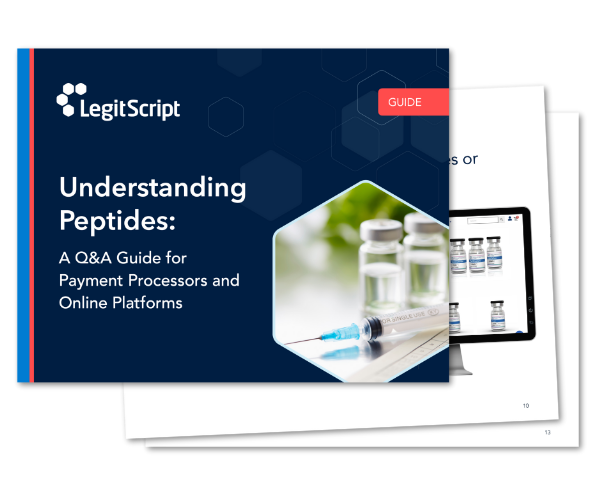Do you want to get more muscular, and maybe lose some weight? There are peptides for that. What if you want to become more tan, or improve your skin and nails? There are peptides for those too. Recover from injuries faster? Fix your digestive issues? Slow aging? You guessed it — peptides.
Peptides are having a moment. But for payment processors, e-commerce marketplaces, and other online platforms, these cure-alls can also cause headaches. Keep reading to learn why they pose risk and then download our Peptides Q&A guide.

October 30, 2025 | by LegitScript Folks
How Peptides Are Being Used
Once limited to scientific research and specialized pharmaceuticals, they’ve now surged into mainstream conversations around fitness, wellness, and even anti-aging. From “research chemicals” to “performance enhancers,” these short chains of amino acids are showing up everywhere online — and that’s where the risk begins.
While some peptides are FDA-approved and used in legitimate medical treatments, many others are experimental, unapproved substances being improperly sold online for human use. These products are often marketed on social media and sold through websites that can look clinical, official, and professional. Behind the clean branding, however, can lie a tangle of compliance, safety, and reputational hazards for payment companies, online marketplaces, and social platforms.
Understanding Peptides Is Critical to Mitigating Risk
Unapproved peptide sales can expose businesses to regulatory enforcement, card network fines, and reputational harm with partners and the public alike. Regulatory scrutiny is particularly strong because of the threat to consumer health: many of these products have not been tested for efficacy or vetted for safety.
But which peptides merchants are legitimate, and which are illicit? Many merchants selling "research chemicals" try to mask intent with disclaimers such as “not for human consumption," but that language is often a red flag rather than a legal protection. It’s important to know what to look out for when vetting a peptides merchant or seller.
The Challenge of Peptides Sales
Distinguishing between legitimate scientific suppliers and risky sellers isn’t always easy. Some merchants mirror the aesthetics of professional laboratories, while others market aggressively to bodybuilders or beauty enthusiasts. Add to that the rising popularity of unauthorized versions of high-profile GLP-1 peptides — such as semaglutide or tirzepatide — and the risk of inadvertently facilitating illegal or unsafe sales multiplies.
Our latest Peptides Q&A Guide breaks down what payment processors and online platforms need to know to stay compliant and protect their ecosystems. The guide explores:
- How peptides are classified and regulated in the U.S.
- Commonly misused peptides and their associated risks
- Key red flags that signal unapproved or illegal sales
- How LegitScript’s solutions help platforms and processors navigate this complex space
As consumer interest in peptides grows, so does the need for vigilance. Understanding the signals of risk is the first step toward preventing consumer harm and avoiding costly compliance errors.
Download the full guide to learn how your organization can identify unapproved peptide sales before they become a regulatory problem.
Understanding Peptides
A Q&A Guide for Payment Processors and Online Platforms
In this in-depth guide, you’ll get introduced to the peptides industry, gaining a better understanding of how it works and learning why there has been a recent surge of interest in these experimental products.




